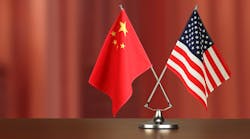The U.S. and China agreed on the outlines of a partial trade accord Friday that President Donald Trump said he and China’s Xi Jinping could sign as soon as next month.
As part of the deal, China would agree to some agricultural concessions and the U.S. would provide some tariff relief. The pact is tentative and subject to change as Trump prepares to sit down with China’s Vice Premier Liu He later Friday.
The deal under discussion, which is subject to Trump’s approval, would suspend a planned tariff increase for Oct. 15. It also may delay -- or call off -- levies scheduled to take effect in mid-December. Such an agreement would be the first breakthrough in the 18-month trade war that has hurt the economies of both nations.
While the limited agreement may resolve some short-term issues, several of the thorniest disputes remain outstanding. U.S. goals in the trade war center around accusations of intellectual-property theft, forced technology transfer and complaints about Chinese industrial subsidies. The partial deal is not expected to address those items.
Stocks jumped Friday after the news. Equities had advanced globally earlier in the day amid growing conviction that the U.S. and China would negotiate a trade truce. Trump tweeted earlier Friday that “good things” were happening in the two days of meetings -- and that if the countries did reach an agreement, he would be able to sign it without a lengthy congressional approval process.
On Thursday and earlier Friday, Liu and U.S. Trade Representative Robert Lighthizer held the first senior-level discussions between Washington and Beijing since a previous agreement fell apart in May and tariffs were raised in the months after.
The U.S. was threatening to increase tariffs next Tuesday on about $250 billion of Chinese imports to 30% from 25%. More duties on $160 billion of Chinese products were targeted for Dec. 15.
The threat of those import taxes on U.S. consumers, falling around the holiday season, raised the prospect that the U.S. economy would slide toward a recession heading into Trump’s 2020 reelection bid. The American manufacturing industry, which Trump vowed in 2016 to revitalize, is already contracting in part because of the trade war.
People familiar with the tentative deal expect large purchases of U.S. agriculture goods by Beijing. China in recent weeks had already discussed buying more U.S. products such as soybeans, pork and wheat. Some traders remained skeptical that buying soybeans from the U.S. represented a significant breakthrough in the overall trade talks, Bloomberg reported Friday.
Treasury Secretary Steven Mnuchin -- speaking on Friday in Washington at a press conference about Turkish sanctions -- described the two days of U.S.-China talks as “productive.” He didn’t offer specifics about how the negotiations had progressed.
Earlier Friday, Trump indicated in a Twitter post that if the countries did reach an agreement, he would be able to sign it quickly.
Senator Ronald Wyden, the ranking Democrat on the Finance Committee that has jurisdiction over trade policy, pushed back on Trump’s tweet in a statement Friday to Bloomberg News: “Donald Trump should know that any meaningful trade deal is only legitimate because of the authority granted to him by Congress, and that authority can be taken away,” he said.
Under the U.S. Constitution, Congress holds power over international trade. For decades, it has legally delegated trade-negotiating authority to the executive branch. Lawmakers in recent months have grown increasingly wary of what they see as Trump’s abuse of that authority and discussed ways to claw it back, citing the president’s many unilateral tariff measures and a lack of transparency in negotiations.



